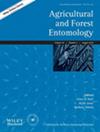Agroecological transition increases arthropod diversity and decreases herbivore abundance on field margins
IF 1.6
3区 农林科学
Q2 ENTOMOLOGY
引用次数: 0
Abstract
In peri‐urban areas, many farmers are transitioning from conventional agriculture to agroecological practices to reduce pesticide input and preserving ecosystem services such as natural pest control. Field margins represent a stable habitat for arthropods, but community structure depends on many factors, including management type and vegetation features. We studied the effects of agroecological transitions and vegetation features on arthropods of horticultural field margins, focusing on three feeding guilds (herbivores, predators and parasitoids). We sampled arthropods using the beat‐sheet method in five conventional fields and five under agroecological transition. We also measured vegetation height, richness, flower abundance and plant cover. Our results showed that arthropod diversity was higher in agroecological fields whereas herbivore abundance was lower, with a consistent pattern across most taxonomic orders. Vegetation features displayed multiple effects among functional and taxonomic groups. Herbivores did not respond to most vegetation variables whereas predators correlated with several, with similar trends among orders. We conclude that agroecological transitions and field margins with high vegetation richness and floral resources influence arthropod communities with potential benefits regarding pest regulation. These practices might be more effective if considered alongside other methods that enhance biodiversity and if they are consistent at a landscape scale.农业生态转型增加了节肢动物的多样性,降低了农田边缘食草动物的丰度
在城市周边地区,许多农民正在从传统农业向农业生态实践过渡,以减少农药投入并保护生态系统服务,如自然害虫防治。田缘是节肢动物的稳定栖息地,但群落结构取决于许多因素,包括管理类型和植被特征。我们研究了农业生态转型和植被特征对园艺田边缘节肢动物的影响,重点研究了三种捕食群体(食草动物、捕食者和寄生蜂)。我们使用拍片法对五个传统农田和五个农业生态转型期的节肢动物进行了采样。我们还测量了植被高度、丰富度、花朵数量和植物覆盖率。我们的研究结果表明,农业生态领域的节肢动物多样性较高,而食草动物丰度较低,在大多数分类学目中都有一致的模式。植被特征在功能群和分类群之间表现出多重影响。草食动物对大多数植被变量没有反应,而捕食者与几个植被变量相关,各目之间的趋势相似。我们得出的结论是,具有高植被丰富度和花卉资源的农业生态转型和田缘影响节肢动物群落,在害虫调控方面具有潜在的好处。如果与其他增强生物多样性的方法一起考虑,并且在景观尺度上保持一致,这些做法可能会更有效。
本文章由计算机程序翻译,如有差异,请以英文原文为准。
求助全文
约1分钟内获得全文
求助全文
来源期刊

Agricultural and Forest Entomology
农林科学-昆虫学
CiteScore
3.60
自引率
6.20%
发文量
66
审稿时长
>24 weeks
期刊介绍:
Agricultural and Forest Entomology provides a multi-disciplinary and international forum in which researchers can present their work on all aspects of agricultural and forest entomology to other researchers, policy makers and professionals.
The Journal welcomes primary research papers, reviews and short communications on entomological research relevant to the control of insect and other arthropod pests. We invite high quality original research papers on the biology, population dynamics, impact and management of pests of the full range of forest, agricultural and horticultural crops.
 求助内容:
求助内容: 应助结果提醒方式:
应助结果提醒方式:


